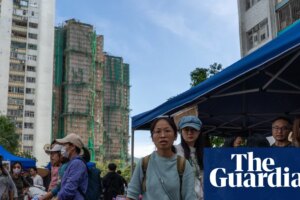
China Evergrande Group’s shares were quietly removed from the Hong Kong Stock Exchange on Monday, drawing the curtain on one of the most spectacular corporate collapses in recent memory. After more than 16 years of trading, the once-mighty property developer that epitomized China’s economic boom has been reduced to a cautionary tale about debt, ambition and the limits of growth.
It’s hard to overstate just how far Evergrande has fallen. At its peak, the company was worth more than $50 billion and seemed unstoppable. Its founder, Hui Ka Yan, went from rural poverty to topping Forbes’ list of Asia’s wealthiest people in 2017 with a fortune of $45 billion. Today, that fortune has evaporated to less than $1 billion, and Hui faces a lifetime ban from China’s capital markets.
“Once delisted, there is no coming back,” says Dan Wang, China director at political risk consultancy Eurasia Group. “The delisting now is surely symbolic but it’s such a milestone.”
The Rise and Spectacular Fall
Evergrande wasn’t just another property company—it was a sprawling empire that seemed to touch every corner of Chinese life. The firm had 1,300 projects across 280 cities, owned China’s most successful football team Guangzhou FC, and even ventured into electric vehicles. But this vast operation was built on a shaky foundation: roughly $300 billion in borrowed money, making it the world’s most indebted property developer.
The cracks began showing in 2020 when Beijing introduced new rules to control how much big developers could borrow. The regulations, known as the “Three Red Lines” policy, effectively cut off the financial oxygen that had fueled Evergrande’s breakneck expansion.
Desperate for cash, the company started offering properties at massive discounts. But it wasn’t enough. By late 2021, Evergrande was defaulting on overseas debt payments, and after years of failed restructuring attempts, Hong Kong’s High Court ordered the company liquidated in January 2024.
The numbers tell the story of the devastation. Liquidators recently revealed that Evergrande still owes $45 billion to creditors but has managed to sell just $255 million in assets. They believe a complete overhaul of the business “will prove out of reach.”
Adding insult to injury, regulators discovered in March 2024 that the company had overstated its revenue by a staggering $78 billion. Hui was fined $6.5 million for the accounting irregularities—a drop in the bucket compared to his lost fortune.
A Crisis Bigger Than One Company
Evergrande’s troubles might grab headlines, but the rot runs much deeper through China’s property sector. According to recent analysis, developer shares recorded their biggest weekly drop in four months this July after a key government meeting failed to announce concrete revival measures.
“The property slump has been the biggest drag on the economy, and the ultimate reason why consumption is suppressed,” Wang explains. It’s a massive problem for a country where real estate historically accounted for about a third of economic activity.
The human cost has been severe. Jackson Chan from financial markets research platform Bondsupermart points to “massive layoffs” by heavily indebted developers, while those lucky enough to keep their jobs have seen significant pay cuts.
For ordinary Chinese families, the crisis hits even closer to home. Most put their savings into property, viewing real estate as their primary investment. With housing prices dropping by at least 30% in many areas, millions have watched their life savings shrink.
“With housing prices dropping, many Chinese families have seen their savings fall in value,” says Alicia Garcia-Herrero, chief economist for Asia Pacific at French bank Natixis. “This means they are less likely to spend and invest.”
A Tale of Two Markets
Not all of China’s property market is suffering equally. First-tier cities like Shanghai and Shenzhen are showing surprising resilience. A Greentown China Holdings project in Shanghai sold out within a day earlier this year at 195,000 yuan per square meter, and Shanghai’s new home prices actually rose 10.1% year-on-year in March.
But venture beyond these marquee cities and the picture turns grim. Third- and fourth-tier cities are drowning in unsold inventory—421.58 million square meters worth as of March—while their populations shrink. Beijing’s second-hand prices fell 6.47% and Guangzhou’s dropped 5.84% during the same period Shanghai was posting gains.
Government Walking a Tightrope
Beijing finds itself in a delicate position. Officials have rolled out various support measures—relaxed purchase restrictions, lower mortgage rates, and special bonds to help local governments absorb excess housing—but they’ve been careful to avoid direct bailouts of failed developers.
The strategy seems deliberate. Housing ministry officials recently visited major provinces to inspect local markets and call for greater stabilization efforts, but the message is clear: the government won’t rescue companies that took excessive risks.
“Beijing has sent a clear message on its intention of not bailing out the housing sector,” Wang notes. The Chinese government appears determined to avoid encouraging more risky behavior in an already overleveraged industry.
Other Dominoes Still Falling
Evergrande isn’t the only casualty. China South City Holdings was recently handed a winding-up order by Hong Kong’s High Court, making it the biggest developer forced into liquidation since Evergrande. Meanwhile, Country Garden, another property giant, is still trying to secure a deal with creditors to write off more than $14 billion in outstanding foreign debt.
“The whole property sector has been in trouble. More Chinese property firms will collapse,” predicts Professor Shitong Qiao from Duke University.
Goldman Sachs warned in June that property prices will continue falling until 2027, though some analysts are starting to see potential signs of stabilization. The market share of state-owned developers has expanded from 15% four years ago to 23% in the first half of 2025, suggesting some consolidation toward more stable players.
A New Economic Model
Perhaps most significantly, the property crisis reflects China’s broader economic transition. President Xi Jinping has made clear that the country’s future lies not in construction and real estate speculation, but in high-tech industries like renewable energy, electric vehicles, and robotics.
“China is in a deep transition to a new age of development,” Wang observes.
While some analysts believe the property market may be bottoming out, most agree that any recovery will be slow and partial. Morgan Stanley suggests property sales will likely remain weak through the third quarter of 2025, and even optimistic forecasters don’t expect a strong rebound.
For China’s economy, which has slowed to around 5% growth—respectable by global standards but sluggish for a country that regularly achieved double-digit expansion just over a decade ago—the property crisis remains the biggest headwind.
Garcia-Herrero puts it bluntly: “There is no real light at the end of the tunnel.”
As Evergrande’s shares disappear from trading screens for the final time, they leave behind more than just financial losses. They mark the end of an era when property development was synonymous with progress in China, and the beginning of an uncertain transition to whatever comes next.
The next liquidation hearing is scheduled for September, where creditors will learn how much—if anything—they might recover from the wreckage of what was once China’s property crown jewel.





